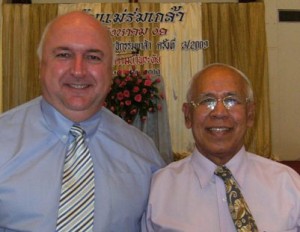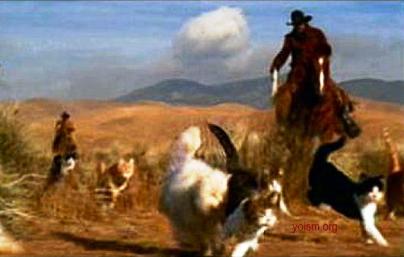 OK, so there’s this guy who’s asking his brother-in-law for a major favor. This isn’t like lending a wheelbarrow or babysitting the kids for a weekend. This order’s pretty tall. As in,
OK, so there’s this guy who’s asking his brother-in-law for a major favor. This isn’t like lending a wheelbarrow or babysitting the kids for a weekend. This order’s pretty tall. As in,
Could you leave your family?
Oh, and your country, too?
And help me babysit my family of three million?
Hey, what’s a family for?
And get this – all indications are that that the brother-in-law did it.
Curious yet? I sure would be, for several reasons: [click to continue…]
I expected to learn some things and be reminded of some things when I made my first trip to Thailand. I was not disappointed. To put an exclamation point on our trip, here are some things I learned along the way…
 You may think you know what humidity is, but you’re wrong.
You may think you know what humidity is, but you’re wrong.
My wife had one unending childhood adventure.
Churches everywhere are made up of humans, with human needs, human potential, and human flaws.
Pastors may not speak the same language, but the leadership issues they face are the same worldwide.
 It’s amazing the trust you can gain with a sincere smile. [click to continue…]
It’s amazing the trust you can gain with a sincere smile. [click to continue…]
 Over the last two weeks, I have spent meaningful time with six different pastors who live 12 time zones away from me. Each is uniquely gifted, varied in experience and have completely different assignments. In the course of that time, I’ve seen and heard some things, learned some things, observed some things. Here’s a sampling:
Over the last two weeks, I have spent meaningful time with six different pastors who live 12 time zones away from me. Each is uniquely gifted, varied in experience and have completely different assignments. In the course of that time, I’ve seen and heard some things, learned some things, observed some things. Here’s a sampling:
- Each pastor has his own unique model or approach for ministry.
- Each is convinced his ministry model is the right one, at least for him.
- Each has questions or concerns, if not open criticism, about other models of ministry practiced by others.
- Nearly every one of them has been hurt pretty deeply by people in Church World.
 “What are you teaching them about?” my daughter asked – referring to our upcoming pastors and leaders training in Thailand.
“What are you teaching them about?” my daughter asked – referring to our upcoming pastors and leaders training in Thailand.
“Leadership,” I said.
“Well, can I ask you something? Is there a way – I’m not sure how to say this – is there a way to ‘dumb down’ leadership training?”
My pause meant, “Keep going.”
“I have to train these fifth-and-sixth-grade leaders every day at FROG camp for about 30 minutes on being a leader, and I was wondering how I could explain biblical leadership on their level.”
I did a random brainstorm with her. Talked about David and Joshua and Paul and Jesus. Hurled out Bible passages like Joshua 1:1-9, 2 Timothy, 1 Peter 5:2-4, 1 Corinthians 2:1-5. She said “thanks,” but I hung up with the feeling that I hadn’t “dumbed down” anything.
That got me to thinking later. I have a Ph.D. in Organizational Leadership. I’ve spent years studying theories and models, biblical principles and best practices. But none of them – none – involved fifth- or sixth-graders.
Maybe we have it backwards. Rather than presuming to teach 11-year-olds all about leading, maybe we should try to learn some things from them. [click to continue…]
What the Best Restaurants Can Teach You and Your Organization About Success
 You may not know this, but for a season I helped my wife run anywhere from one to three restaurants. The season was just long enough to convince me, if I needed any convincing, that running restaurants was not my calling. That said, I have new respect for anybody who has to cook, serve, or make a profit from folks like – well, me. I never worked harder physically, or encountered more of a call to real, practical servanthood in my life.
You may not know this, but for a season I helped my wife run anywhere from one to three restaurants. The season was just long enough to convince me, if I needed any convincing, that running restaurants was not my calling. That said, I have new respect for anybody who has to cook, serve, or make a profit from folks like – well, me. I never worked harder physically, or encountered more of a call to real, practical servanthood in my life.
In our culture we eat 21 meals a week, give or take. To create an environment that would motivate somebody to return again and again, and to talk about your place to their friends, and get to the end of the month with money in the bank… this is no easy task.
So when somebody does it well, I believe it can teach us some things about succeeding in the organizations, businesses, and yes, congregations we all relate to.
Lately I’ve heard of three remarkable places – none of which I have experienced personally. But I will, if given the chance! What intrigues me is what these eateries suggest to me as a pastor and someone who’s spent a lot of time studying successful organizations and teams. Later, if this “whets your appetite” (sorry, it’s Monday – that’s as close to funny as I can get), there are other transferable lessons we can explore. [click to continue…]
 One of our inside family jokes has to do with a certain child of ours who had the hardest time simply apologizing or admitting she was wrong.
One of our inside family jokes has to do with a certain child of ours who had the hardest time simply apologizing or admitting she was wrong.
(This same child, as a two-year-old, used to wear a t-shirt with the picture of a well-known TV character who had a similar problem. The most he could ever do was say, in his coolness, “I was wr-r-r-r-r.” I wonder if the t-shirt rubbed off somehow.)
Anyway, the conversations would go something like this:
“You need to tell her/him you’re sorry.”
“But I didn’t mean to.”
“It doesn’t matter – you did it. Say you’re sorry.”
“But I didn’t mean to.”
“But you did it.”
“It’s not my fault.”
“SAY IT!”
“I DIDN’T MEAN TO!”
Where Could She POSSIBLY Learn Something Like That?
To this day, we haven’t really understood what a simple apology symbolized to this child, but she wasn’t buyin’. But let’s face it. We all come by our reluctance to admit fault pretty honestly. [click to continue…]
 Tense Truth: There are no solutions to problems that do not require some kind of change. And there is no change that doesn’t create problems of its own. The solution is not to avoid change or eliminate problems. Rather, it is to anticipate future challenges with a solution-based mindset, even while we attack the problems of today.
Tense Truth: There are no solutions to problems that do not require some kind of change. And there is no change that doesn’t create problems of its own. The solution is not to avoid change or eliminate problems. Rather, it is to anticipate future challenges with a solution-based mindset, even while we attack the problems of today.
John Miller, in his book, QBQ, The Question Behind the Question, tells the following story:
When Stacey was 12 years old, she and her father, a pilot, took off on a Sunday afternoon joyride in their single engine Cessna. Not long into the flight, and about a mile up over Lake Michigan, the joy of their father-daughter adventure came to an abrupt halt. Stacey’s father turned to her and in a calm, reassuring tone he said, “Honey, the engine has quit. I’m going to need to fly the plane differently.”
Like Miller, I love the phrase, “fly the plane differently.” It speaks of how problem solvers (read “leaders” here) approach changing conditions and frame crisis situations. He didn’t look for somebody to blame, bail out of the plane, or give up on the laws of aerodynamics. He also didn’t magnify the fear of the situation. He didn’t try to fix the engine! And most importantly, he didn’t stop flying.
He simply changed in response to a new set of information and a new horizon of challenges.
Tony Robbins on Problems
On a recent video blog, Tony Robbins said: [click to continue…]

From a sign in Chicago.
I’m fairly certain more people turn right looking for North Avenue than they stay straight or turn left.
Why?
Because the mind can’t focus on the opposite of an idea.
People tend to go in the direction of your arrows (your example), not the direction of your words.
They gravitate toward what you tell them to avoid, unless you actually point them in a better direction.
They become what you criticize or fear or hate or warn against or dread.
What you say is communication; that’s important.
Where you point is leadership. That is vital.
(Photo by Andy Sernovitz)
(A spiritual leadership fable.)
 Hi, I’m Josh. Pleased to meet you.
Hi, I’m Josh. Pleased to meet you.
Hi, Josh. I’m Andy. So tell me about yourself.
I’m a poker.
A what?
A poker.
You mean, like a poker player?
No. I mean, like a poker in your fireplace.
You’re a poker?
Yep. Poker.
Okay, I’m steppin’ out a little here, Josh. What does a poker do?
Pokes.
(Should’ve seen that coming.) Okaaay. Pokes what?
I poke people.
Seriously?
Yep.
You just walk up to them and poke them with your finger?
Naw, not like that. That’s creepy.
Ya think?
I do for people what a poker does for your fireplace. [click to continue…]
 “We have a problem,” Perry said. Thus began the conversation the led to my first senior pastorate. The problem he alluded to was an open church conflict that led to a lot of angry words at a time when the church Perry attended was without a pastor.
“We have a problem,” Perry said. Thus began the conversation the led to my first senior pastorate. The problem he alluded to was an open church conflict that led to a lot of angry words at a time when the church Perry attended was without a pastor.
He was asking me to come and preach (I was the associate pastor at a nearby church). I did, and the rest, as they say….
As long as businesses, churches, and other types of organizations are comprised of humans, they will eventually experience setbacks, upsets, dysfunction, and problems. Nobody gets it right all the time, and even healthy organizations must confront serious problems.
Broken organizations, however, are different. [click to continue…]
OK, so there’s this guy who’s asking his brother-in-law for a major favor. This isn’t like lending a wheelbarrow or babysitting the kids for a weekend. This order’s pretty tall. As in,
 You may think you know what humidity is, but you’re wrong.
You may think you know what humidity is, but you’re wrong. It’s amazing the trust you can gain with a sincere smile.
It’s amazing the trust you can gain with a sincere smile.  Over the last two weeks, I have spent meaningful time with six different pastors who live 12 time zones away from me. Each is uniquely gifted, varied in experience and have completely different assignments. In the course of that time, I’ve seen and heard some things, learned some things, observed some things. Here’s a sampling:
Over the last two weeks, I have spent meaningful time with six different pastors who live 12 time zones away from me. Each is uniquely gifted, varied in experience and have completely different assignments. In the course of that time, I’ve seen and heard some things, learned some things, observed some things. Here’s a sampling: “What are you teaching them about?” my daughter asked – referring to our upcoming pastors and leaders training in Thailand.
“What are you teaching them about?” my daughter asked – referring to our upcoming pastors and leaders training in Thailand. You may not know this, but for a season I helped my wife run anywhere from one to three restaurants. The season was just long enough to convince me, if I needed any convincing, that running restaurants was not my calling. That said, I have new respect for anybody who has to cook, serve, or make a profit from folks like – well, me. I never worked harder physically, or encountered more of a call to real, practical servanthood in my life.
You may not know this, but for a season I helped my wife run anywhere from one to three restaurants. The season was just long enough to convince me, if I needed any convincing, that running restaurants was not my calling. That said, I have new respect for anybody who has to cook, serve, or make a profit from folks like – well, me. I never worked harder physically, or encountered more of a call to real, practical servanthood in my life. One of our inside family jokes has to do with a certain child of ours who had the hardest time simply apologizing or admitting she was wrong.
One of our inside family jokes has to do with a certain child of ours who had the hardest time simply apologizing or admitting she was wrong.


